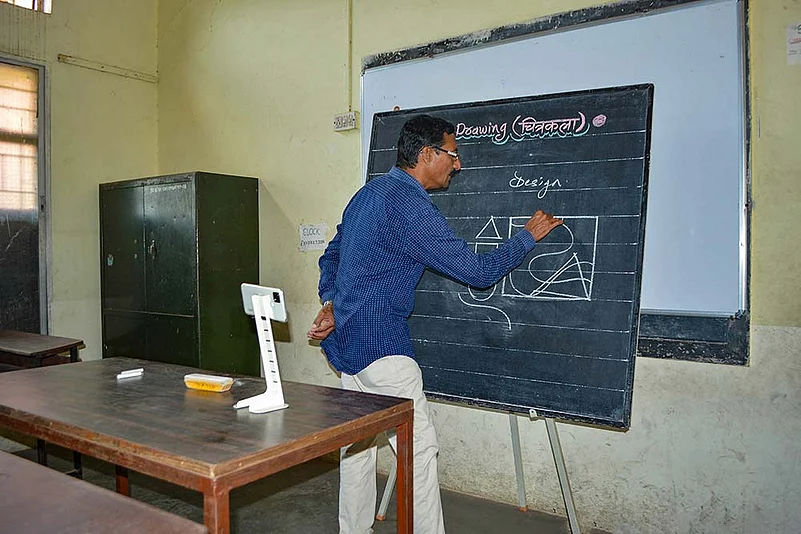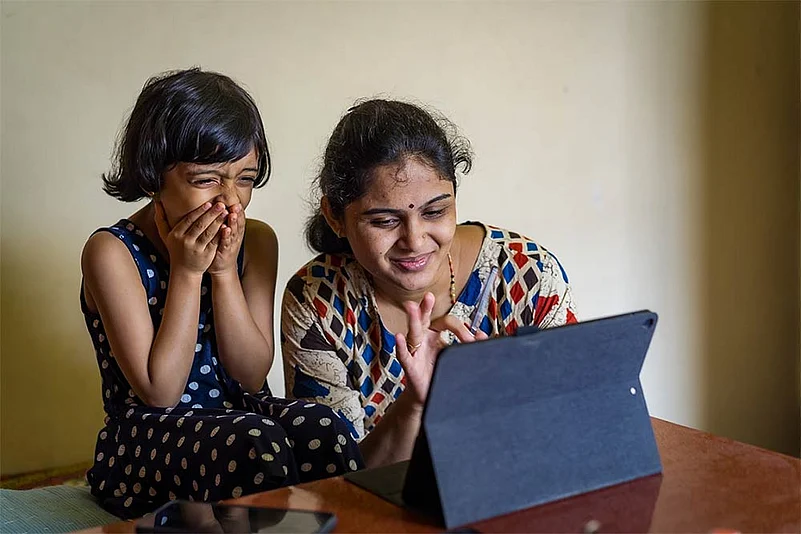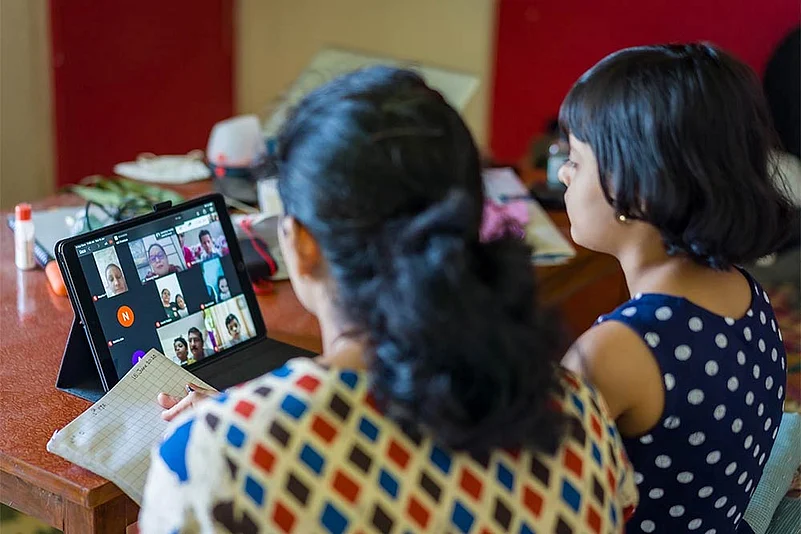A middle school student from Gurgaon, Aisha, who is currently studying in the eighth grade, spent her entire seventh grade attending online school.
Aisha is one among thousands of students who have been missing the joy of attending physical schools.
Talking to Outlook, Aisha shared glimpses of how her days look like. She said that her school timings are fixed and she is all set to face her laptop at 7 am.
When she was told that most people presumed there would not be much difference in the learning process online, the child looked flustered. It was evident that she disagreed.
“I think it is only us, students, who can understand and figure out the vast void that we feel and the gap that we are in. It may look like we are being taught the same syllabus, from the same books, which stands true, but the feeling of not being able to sit in front of my school desk with my friend, and not using notebooks and pens often feels like such a big change.”
And it indeed is a big change! Aisha further added, “I think the way in which we learn online is so different. I can’t exactly point out the differences, but things are definitely different.”
Apart from network and technical issues that has become “a regular issue,” Aisha shared some sombre experiences from her online class, “Once, our teacher had asked a question and since it’s online and there is hardly a ‘wait-for-your-turn’ system, everyone started speaking and it was all chaotic and funny.”
In another incident, she said, “Most of the time, nobody keeps their camera on and it feels like I’m staring at a wall and listening to a big black background speaking to me. Somehow, that human connection is lost in the process.”
Lamenting on missing out on her favourite sports and extra-curricular activities, going to the library and the school canteen, Aisha said that often she gets frustrated and loses the will to attend classes online.
Talking about the changes in Aisha since online classes, her mother said, “Long hours in front of the computer mentally drains her. Post that she also attends her tuitions online as well and then she indulges into other activities very half-heartedly.”
Aisha’s mother raised concern over her child’s unwillingness to go out to play with her friends, which “is extremely unusual as she loved that once”.
“I think she has also lost her ability to keep patience. With the dawn of online classes, she becomes restless these days.”
However, it’s not students alone, but teachers and the entire school faculty has been grappling with the struggles of handling 30-40 children over a laptop screen.
“I feel, as teachers try to connect to each student individually in physical classes, so that apt feedback can be provided during a parent-teacher meeting, the same factors are missing in these online classes,” says Aisha’s mother.
The coronavirus pandemic familiarised us with the ‘new normal’ – seeing the world and learning about it through the windows of our computers.
However, the change that stood out the most while getting accustomed to the new normal was within the education sector where the mode of learning was compelled to be online due to obvious constraints.
With the world being rapidly digitised, the quality of education was not at stake as digital learning had already paved its way before the pandemic.
However, online learning came with its cons, the major being its impact on the mental health of students.

Online mode: Effects
Classes online can be a relatively an easy process, as visual learning has always been the pioneer of concept clarification and has never distressed students unlike routine learning and writing. Online classes allow students to maintain their own pace compared to physical classes that might require students to constantly cope up with their classmates as the degree of transparency is much more in the physical mode.
However, paradoxically, the lack of transparency leads to lost communication as well and ambiguity during academic sessions. Students are also prone to loss of momentum during tests.
How mental health and well-being are affected?
A typical school timetable is designed in a way that balances work stress. This balance is achieved by backing up the academic classes with practical classes, extra-curricular activities, free periods and recesses.
However, in the online mode, activities demanding in-person participation and interaction with teachers and peers are overlooked. The lack of in-person interaction as well as the entire focus being shifted towards academics has resulted in severe levels of stress and frustration, especially in the case of high school students.
According to leading psychologists, the online mode of evaluation as well as the college application process has evoked anxiety and feelings of being flustered among senior students. This has often led to students losing out on motivation and the level of burnout and physical exhaustion is reached quickly.
Research shows that in such a situation, the capability of brains to integrate and analyse is also hindered resulting in poor decision making.
Speaking to international media, UK-based internationally recognised parenting expert, broadcaster, speaker and author of Parenting Made Easy — How to Raise Happy Children (2012), Sue Atkins has explained, “With the sudden halt to in-person learning, many students have missed their friends, yearned to be out of the house, developed erratic sleep habits and drove their (often working) parents crazy. On top of that, many were dealing with the trauma of a sick or dying family member, economic hardship and major changes to the life they once had.”
The best way to find out about the dynamic between mental health and online classes is by actively conversing with people who are living this situation, by this, we infer our information from direct sources.
Speaking to a few students across universities in India and abroad we asked questions that were long waited for.

How have online classes affected the mental health of students?
“I feel, the actual purpose of the online classes which is learning is not being served by online classes. It works well for a brief period but when the online classes turn to become an everyday mode of learning, it feels very exhausting,” said Gargee Goswami, a student in the psychology department at Lady Shri Ram College, Delhi University.
Gargee added, that the classes often become taxing and even if she tries her best to focus, it helps little.
“The most damaging effect is the constant use of screens that affect our eyes. This is from my own experience and I almost have headaches every week which is so agonising,” she adds.
What are some of the daily challenges one faces while attending online classes?
“The communication gap is evident. India is being rapidly digitised; however, it is not yet established on the ground level. Zero in-person interactions have made classes more lecture-oriented than discussion-oriented,” says Aditya Bade, a student at NIRMA University, adding that classes don’t interest him anymore.
Why are people struggling to keep themselves mentally fit during this time? Is it related to human psychology or biology?
“Well, I think it’s both. Due to frequent lockdowns, most of us are not able to exercise ourselves enough, which is a physiological demand,” said Ishika Arora, a student at Freiburg University, Germany.

How do you think can mental health be taken care of during the functioning of online classes?
“Some of the problems that have emerged due to online classes are digital fatigue and isolation. In order to take care of one's mental health, Disha Mukherjee, a student in the psychology department at Lady Shri Ram College, Delhi University suggests a few ways to help oneself.
1. Having a daily mental health check with yourself or journaling can help you stay aware and deal with of all the feelings, emotions and thoughts that might get lost or mixed up due to the virtual mode and seemingly endless screen time.
2. Staying connected with friends and family or any form of social support can alleviate the isolation that one is bound to feel in the online medium.
3. Grounding activities and hobbies like exercising, meditating, cooking, painting, listening to music and so on, can get the brain rid of the constant haze that accumulates during the day and leaves us revitalised.






_570_850.jpg?w=801&auto=format%2Ccompress&fit=max&format=webp&dpr=1.0)









